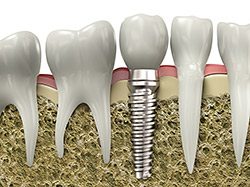 Dental Implants
Dental Implants
People live longer and longer nowadays. Even with regular brushing, dental check-ups, and flossing, our teeth just can’t keep up. If you have lost a tooth or a few teeth, dental implants can help fix your smile.
An implant is a synthetic tooth root shaped like a post and typically made of titanium; through surgery, when completed, this “root” will be surgically placed into the jawbone. After surgery, an artificial tooth will be fixed to the post. You can choose between a permanent or removable implant. As they are more stable and feel more natural, we recommend permanent implants. You do not have to worry too much about potential complications. Titanium, utilized in many knee and hip replacements, is well-suited to pair with human bone. Not everyone is a prime candidate for this procedure.
The perfect implant candidate is a non-smoker with good oral hygiene, healthy gums without disease, and a sufficient amount of bone in the jaw. You can choose from single or multiple implants.

Single or Multiple Implants
Implants offer versatility. For those missing a single tooth, one implant will typically do the trick. A few strategically placed implants can be used as a bridge for several missing teeth. If you have lost all of your teeth, we can use a strategic number of implants to create a permanent full-bridge or full set of dentures.
Advantages Over Conventional Dentures or Bridges
Typical dentures and bridges can be unstable enough to make it difficult to smile or eat with confidence. Implants not only provide a more natural feel than conventional techniques but give you a stronger bite force. As they do not rely on neighboring teeth for support, implants pose no danger to the health of your remaining teeth. Lastly, implants have a much longer lifespan than more conventional bridges. While bridges typically last seven to ten years, implants can last a lifetime.
Post-Treatment Care
Consider the replacement teeth to be as free of limits as your natural teeth. They require the same upkeep: daily brushing, daily flossing, and regular check-ups. Just like with natural teeth, your actions can determine the replacement’s lifespan. The more care and attention you pay to these teeth, the longer they will last.